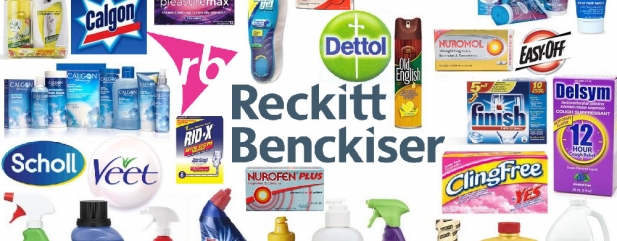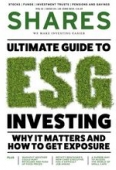Archived article
Please note that tax, investment, pension and ISA rules can change and the information and any views contained in this article may now be inaccurate.
Reckitt Benckiser’s new chief executive has a difficult job ahead

The retirement of company veteran Rakesh Kapoor as chief executive potentially spared the board of consumer goods firm Reckitt Benckiser (RB.) from a tough decision after a promising start to his tenure tailed off badly.
Given that Reckitt has just confirmed Kapoor’s replacement – an external candidate in the form of Pepsi man Laxman Narasimhan – now is a good opportunity to examine the business he will inherit and the changes he might make once he takes over in September.
WHAT IS THE COMPANY’S STRUCTURE AND BUSINESS MODEL?
Reckitt ranks just outside the FTSE 100’s top 10 by market value at the time of writing. In 2017 the company divided itself into two businesses units: Health, which encompasses brands such as Durex, Nurofen and Strepsils; and Hygiene Home which sells everything from Dettol disinfectant to Vanish stain remover and Air Wick air freshener.
The Health business is the more profitable of the two and there is speculation Reckitt might pursue a more permanent separation of the two units.
WHAT’S GONE WRONG AT RECKITT?
Having joined the company in 1987, Kapoor took over as chief executive in September 2011. At first everything seemed to go well as sales continued to build and the company was rewarded with a strong advance in its share price. Then like-for-like sales growth, stripping out the impact of currency movements and acquisitions, began to slow.
The $18bn capture of the Mead Johnson infant nutrition business in 2017 may have boosted sales but it stretched Reckitt’s balance sheet and raised further questions about Kapoor’s handling of the business, while missing out in an auction of Pfizer’s consumer health assets in 2018 was also seen as a disappointment.
In addition, the company was hit by a high-profile cyber-attack, the ongoing fall-out over the health impact of a humidifier disinfectant sold in South Korea and, more recently, legal troubles at its pharmaceutical spin-off Indivior (INDV). Reckitt’s shares are now nearly 20% below their 2017 record highs.
WILL NARASIMHAN INCREASE INVESTMENT?
Several analysts have suggested Kapoor’s successor might look to rebase or reset margins. In effect this is another way of saying he might boost investment in the company’s brands.
Shore Capital analyst Alex Smith says: ‘As an outsider, he probably has more of a license (if he felt the need) to reset Reckitt’s industry leading margins and to reinvest in the business, including perhaps raising capital expenditure which has been notably below peers.’
WILL HE SPLIT THE TWO BUSINESSES?
RBC Capital Markets analysts reckon a split has become less likely due to Narasimhan’s appointment ‘We’re intrigued. Our assumption had been that the new CEO would be an internal appointee. Our reasoning was that Reckitt Benckiser would be broken up over the next 18 months into two separately owned businesses, Health and Hygiene/Home, following the completion of the Reckitt Benckiser 2.0 programme.’
Narasimhan’s appointment as head of the Health business as well as group CEO does suggest the company’s future strategy will be more closely tied to the Health arm.
WILL HE CHANGE THE CULTURE?
There has been criticism of the high levels of executive pay and corporate culture at Reckitt and it certainly appears to have insulated itself from change through its leadership positions.
Kapoor, a long-time employee, took over from Bart Becht who had led the company since its 1999 formation through the merger of the UK’s Reckitt & Colman and Dutch group Benckiser.
US investment bank Jefferies, commenting after Kapoor announced he was standing down in January, says: ‘The unique Reckitt Benckiser pay-for performance model, so powerful for so long, is now under pressure, laying bare the fact that Reckitt Benckiser has the weakest culture and work-style ratings in the peer group.’
WHAT OTHER CHALLENGES WILL HE FACE?
Among the other items likely to pile up on Narasimhan’s desk is Indivior. The pharmaceutical firm has been charged with fraudulently marketing its Suboxone Film opioid addiction treatment. Although the business was spun off in 2014, the alleged wrongdoing largely falls in a period when Indivior was a wholly owned subsidiary of Reckitt.
The former parent company has set aside $400m to cover any liabilities relating to the case but this remains a key uncertainty for investors with the US Department of Justice reported to be pursuing a multi-billion dollar fine.
A big financial hit relating to Indivior would do nothing to improve Reckitt’s balance sheet which remains stretched from the blockbuster takeover of Mead Johnson. At the last count net debt totalled £10.4bn.
A more existential threat to the business is posed by changing consumer tastes. People’s appetite for big brands appears to be fading as individuals look for increasingly customised products, with smaller manufacturers better able to compete with their larger peers as sales have shifted from the shelves to the internet.
If Narasimhan matches the length of Kapoor’s tenure at Reckitt this trend is likely to become an increasingly pressing issue for him to address.
SHARES SAYS: At £65.65 Reckitt trades on a 2019 price-to-earnings ratio of 18.5 – a discount to its closest peer on the UK stock market Unilever (ULVR) on more than 20-times. However, we think investors should resist the temptation to take advantage of this disparity.
We think there is a risk Narasimhan will follow the playbook of many incoming CEOs and kitchen sink (get all the bad news out early) on the business to give himself a realistic starting point for progress.
The time to reassess the investment case is once this process has been completed.
Important information:
These articles are provided by Shares magazine which is published by AJ Bell Media, a part of AJ Bell. Shares is not written by AJ Bell.
Shares is provided for your general information and use and is not a personal recommendation to invest. It is not intended to be relied upon by you in making or not making any investment decisions. The investments referred to in these articles will not be suitable for all investors. If in doubt please seek appropriate independent financial advice.
Investors acting on the information in these articles do so at their own risk and AJ Bell Media and its staff do not accept liability for losses suffered by investors as a result of their investment decisions.

 magazine
magazine










